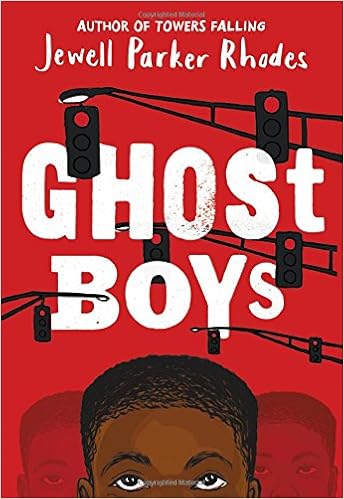
I spent two hours of my Sunday on the couch, reading Jewell Parker Rhodes' Ghost Boys. It is on our state's Bluebonnet Award Nominees list for 2019-2020. I knew the basic premise of the book--a twelve-year-old black boy playing with a toy gun is shot and killed by a policeman, and becomes a ghost--and I was curious to see how the topic is handled in a story written for children. Rhodes skillfully navigated the effects of 9/11 on families and our lives today in Towers Falling, but this topic seems to hit closer to home. Several of my students are already starting to read the nominees; would I have to caution them before reading this one?
I didn't realize how much I had been holding my breath until I let out a long exhale at the end of Ghost Boys. I went and folded laundry afterward, not because the book was trivial, but exactly the opposite. The possibilities for so many discussions, so much awakening, the chipping away of childhood innocence swirled in my mind, and I had to do something with my hands while I thought about how to approach this review.
My own Q&A:
Does this book belong in my school library? Yes, sadly, because this is real life for many children in our country--and within urban areas of our own state. A window into other's lives for some children, a mirror for others.
Does this book villainize police officers? No, it doesn't. Rhodes describes the negative effects of the shooting on the officer's mental health and his family. Without revealing the ending, the overall message is to know better, we can do better.
Is the book scary? The premise is scary enough! The ghosts are not; they are reminders that this issue is not new, but has been woven throughout American history.
Is this book a good fit for my child? I think Ghost Boys should be included in seventh grade-on-up discussions on civil rights and racism in the U.S.; it is a perfect beginning for so many discussions (see list below). For fourth through sixth graders, I would caution that this book will likely bring up a lot of questions, and that they should have an adult in mind to talk through those topics and feelings. The book does reference the Emmett Till case, and makes the point that a child must be mature enough to face those facts--in the case of the fictional characters, seventh grade was suggested.
Discussion points found in this book that may come up for students (bearing in mind that students don't necessarily bring as much knowledge as an adult to the book, and some points may just "fly over their heads"):
- Racial bias in police shootings
- Racial prejudice, past and present
- The effects of poverty on living conditions (drug dealing as income, welfare)
- Why some people feel the need to carry guns to feel safe, and why policemen are hyper-vigilant in some areas (and why toy guns can pose a threat)
- Why Jerome's parents were worried about his walk to and from school
- The inequities between schools in higher- and lower-economic areas
- Bullying in school
- Community and family responses to shootings
- How culpability is determined in police shootings (judicial system)
- The afterlife, and how cultures honor their dead
I'm glad I read this book before next school year. I'm glad it made me hold my breath and feel uncomfortable, because lying on my couch in my fairly quiet suburb, it reminded me that there is still so much social change that needs to happen.
Our children may lead that change because of this book. Thank you, Jewell Parker Rhodes, for unflinchingly, yet tenderly, presenting this difficult topic. May it make a difference.
No comments:
Post a Comment